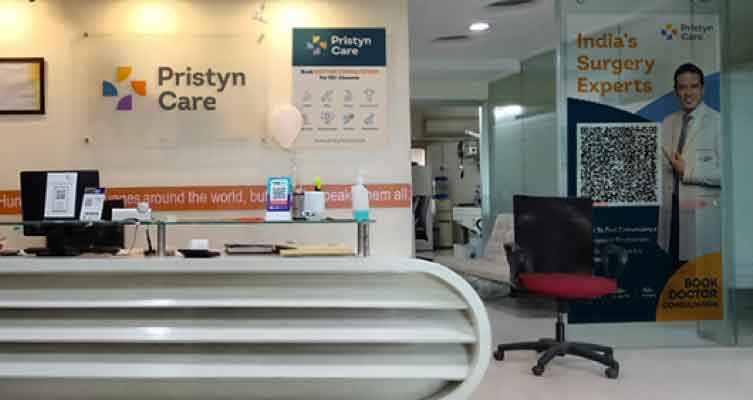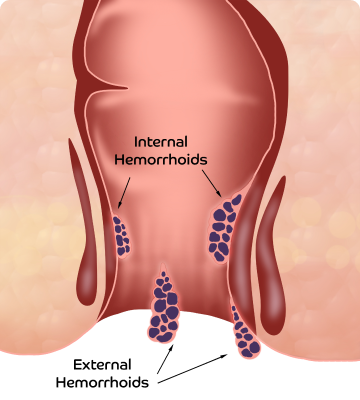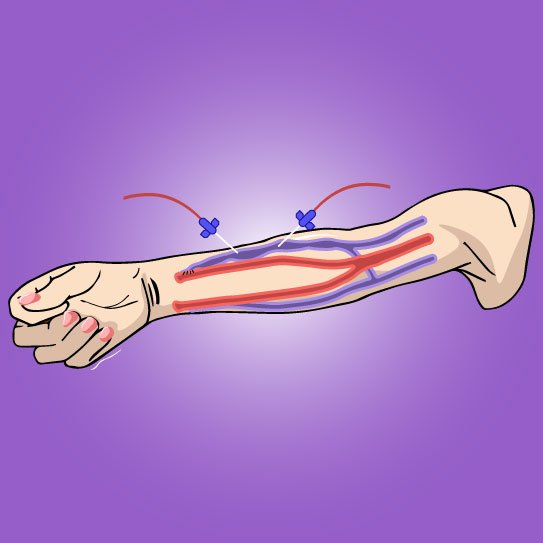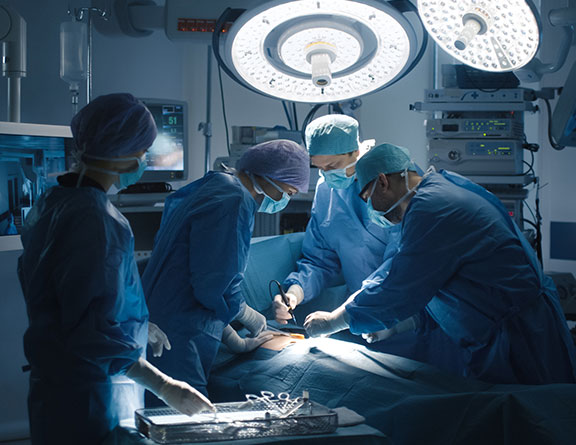What is the need for an arteriovenous fistula for dialysis?
An arteriovenous fistula is very important for patients who have to undergo dialysis due to kidney failure. During dialysis, the impure blood is taken out from the veins, filtered outside the body with the help of a dialysis machine, and then the pure blood is transferred to the arteries.
The same procedure is repeated multiple times until the patient finds a healthy kidney for transplant.
To make the dialysis successful, it is important that the blood vessels can bear the pressure of the blood entering them. Typically, the veins are small and only about 30-40 ml of blood flows through them per minute. The goal is to make the veins strong and thick enough that they can tolerate the blood pressure and frequent insertion/exertion of the dialysis needles.
This is why an arteriovenous (AV) fistula is needed for long-term and adequate hemodialysis treatment.
How is the AV fistula used for dialysis treatment?
Once the arteriovenous fistula is created, it is left to heal. The actual use of the fistula begins when the first session of hemodialysis takes place. The patient is given local anesthetic cream to apply on the skin above the fistula, and two needles are inserted into it. One needle goes into the vein and the other goes into the artery. The arterial needle is connected to the vein and it carries the blood from the body to the dialyzer. The venous needle is connected to the artery and carries fresh and filtered blood back to the body.
The entire dialysis treatment takes around 3-4 hours, and each time the needles are connected and ejected from the blood vessels. Throughout the treatment, you won’t feel any kind of pain or discomfort.
What are the advantages of the AV fistula created for dialysis?
- AV fistula is a long-lasting and more effective form of vascular access.
- The procedure doesn’t involve the implantation of any synthetic or artificial material in the body.
- Creates a safe channel for the blood flow and decreases the time of dialysis as well.
- The AV fistula has minimal risks of infection and is less prone to clotting and other problems associated with dialysis access.
- Recovery after the AV fistula surgery is fast and the patient will be able to resume daily activities as expected.
What are the risks associated with arteriovenous fistula (AVF) surgery?
Similar to other surgeries, the creation of an AV fistula also has some potential risks and complications. However, only a minority of the patients experience these complications.
- Clotting of Fistula- Blood clotting may happen and disrupt the blood flow in the arteries or veins.
- Steal Syndrome- When a large amount of blood flows from the artery to the vein, it can reduce the blood supply in the hands and fingers, leading to symptoms like cold and numb fingers. This phenomenon is known as steal syndrome, and if this happens, revision surgery will be performed to improve the blood flow.
- Infection- Another possible complication of the arteriovenous fistula is wound infection. It will require antibiotics for treatment.
- Swelling- This complication usually arises when a graft is used to create the fistula. It can be resolved by raising the arm above the level of the heart and performing some finger exercises.
Most of the risks associated with surgery can be mitigated by an experienced vascular specialist.
Take Proper Care of the Arteriovenous Fistula for Dialysis
- Keep the AVF clean. Wash the arm every day, especially before the dialysis treatment.
- Make sure that you don’t press the fistula or wear tight clothes as it can compress the arm.
- The kidney doctor will teach you how to check the pulse or vibration through the fistula. You will have to check the pulse every day to ensure that the fistula is not blocked.
- Never allow the lab technician or doctors to take blood pressure or blood samples from the arm that has the fistula. It will increase the risk of damage to the fistula and blood clotting.
- Avoid lifting heavy objects as it will put direct pressure on the fistula.
- Make sure that the site of the AVF is not cut or injured.
Book An Appointment with Pristyn Care Vascular Specialists in Noida
To consult the expert vascular surgeons in Noida for AVF surgery, i.e., to create an arteriovenous fistula for dialysis, you only need to get in touch with us. You can use any of the following ways to schedule your appointment-
- Give us a call on the number given at the top of the page and talk to our medical coordinators directly.
- Fill out the “Book Appointment” form and submit your details. Our representatives will get back to you and discuss the appointment details.
- Download the Pristyn Care mobile application on your device and confirm the appointment directly with the doctor of your choice.
You can schedule the consultation before and after the procedure at your convenience.














.svg)









